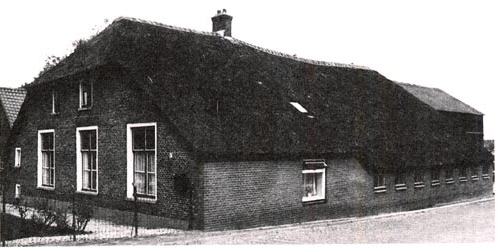
Henk Van Arkel estimates commercial insurers would charge him £500 a year for storm and fire damage cover on this old-style thatched farmhouse. Instead he pays £130 to a local co-operative insurance society.
Back to main text of Chapter 4
GOING DUTCH KEEPS INSURANCE PAYMENTS LOCAL

The payment of household and motor insurance premiums causes a serious and growing loss of national currency to almost every British and Irish community, but there is a way by which this can be reduced. Henk van Arkel, the director of the Dutch non-governmental organisation Aktie Strohalm, lives in Soest, a village within communting distance of Utrecht, in a thatched house he bought from a farmer who had built himself a spanking new residence across the road. Insuring a thatched building can be as difficult and expensive in the Netherlands as anywhere else, so van Arkel joined the local insurance co-operative, Statuten Onderlinge Branverzekering UA, which had insured the house for the farmer. "There are five hundred of these co-ops throughout Holland", he explains. "The way they work is that they collect premiums from their members based on the value of their properties and cover a proportion of the risk themselves. That keeps quite a lot of money in the community. The rest of the risk they cover by sharing it with other local co-ops by re-insuring with a mutual insurance company a lot of them own, SOBH."
Van Arkel thinks that the system works well because with only 425 members in the Soest co-op, one's fellow-members would soon know if anyone made a false or inflated claim, and be very unhappy about it. "It would be reflected immediately in the rates of premium we all had to pay," he says. "The cost of insurance through these co-ops varies quite a lot beacuse of their claims experience but it is normally cheaper than with the commercial companies".
The co-op, which was founded by farmers in 1885, naturally has to maintain reserves to cover it if claims are greater than its share of the annual premium income. "We've got 400,000 guilders (£175,000) set aside," he says. "I don't know how big reserves the co-op kept before 1944. It didn't take out re-insurance until then."
Back to main text of Chapter 4
| Search | Contents | Foreword | Preface | Introduction |
| Chapter 1 | Chapter 2 | Chapter 3 | Chapter 4 | Chapter 5 | Chapter 6 | Chapter 7 |
| Epilogue | 2002/3 Updates | Links | Site Map |